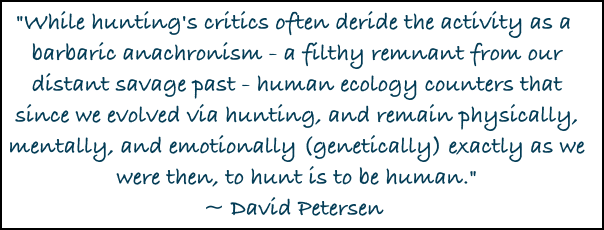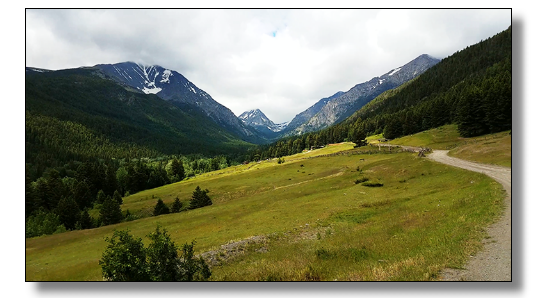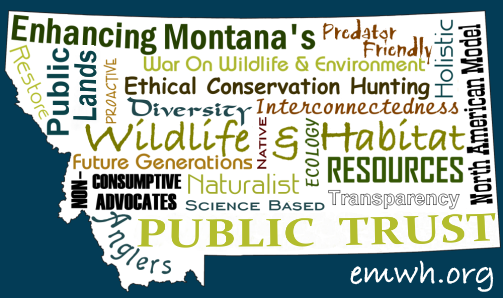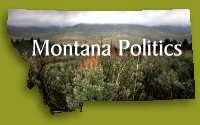
Ethical Hunting
|
Hunting, as with any other interest group, cannot be painted with a broad brush and have those perceptions be indicative of all hunters. EMWH recognizes the diversity of hunters (poachers are not hunters). This site focuses on Ethical Hunting and finding common ground. For EMWH, the North American Model is foundational. "The North American Model of Wildlife Conservation is a set of principles that, collectively applied, has led to the form, function, and successes of wildlife conservation and management in the United States and Canada." It has been stated that the difference between wildlife management in America, as opposed to the European Model, is that in Europe, wildlife is connected to the land, belonging to the king, prince, lord who owns it. In the North American Model in the US, wildlife is connected to the people, established as a Public Trust. In the United States, governance over wildlife management is divided between the federal government and individual states. The Public Trust Doctrine established the individual states as trustees our wildlife, except where the US Constitution provided for federal oversight. The keystone component of the North American Model is the concept that wildlife is owned by no one, being held in trust for the benefit of present and future generations by the government as a steward of the people. This is the legal foundation for federal, provincial, and state wildlife agencies. The common law basis in the U.S. is the Public Trust Doctrine, a Supreme Court decision in 1842 that declared certain resources could not be taken into private ownership (Martin v. Waddell; Batcheller et al. 2010). In other nation models, hunting is restricted to those with certain status, such as land ownership, wealth, or other privileges. Theodore Roosevelt and Aldo Leopold envisioned a national model where all US citizens had an opportunity to participate in conservation and hunting, that hunting was a tool of wildlife management. With this in mind, EMWH would like to remind the non-consumptive conservation and conservation hunting community of the roots of conservation - sportsmen and the common ground. But hunting alone does not equate to conservation. There must be the element of ethical hunting. "A minimal level of sportsman ethics afield is mandated by written law. Beyond that, say, when an action is legal but ethically questionable, or when (as Aldo Leopold long ago pointed out) no one is watching, hunter ethics is an individual responsibility. As the existentialists would have it, we determine our own honor minute by minute, action by action, one decision at a time." ~ David Petersen |
MT Hunt Right
Ethical Hunting
North American Model & Public Trust Doctrine
- Western
Association Of Fish And Wildlife Agencies Resolution - The Public Trust
Doctrine
In Fish and Wildlife Conservation - The North American Model of Wildlife Conservation - Technical Review 2012
- The Public Trust Doctrine - Implications For Wildlife Management and Conservation in the United States and Canada, Technical review 2010
Why I Hunt: Thoughts from a Wolf-Loving, Elk-Killing Tree Hugger by David Stalling
Can Environmentalists Hunt? by David Stalling
Ethics versus Preferences by James A. Tantillo Orion, The Hunters Institute
“Natural causes”: Life and death, food and fantasy by Tovar Cerulli
A
Caretaker and a Killer: How Hunters Can Save the Wilderness
Stereotypes of gun-toting brutes and tree-hugging hippies miss the basic
facts about who is protecting nature—and why, by Tovar Cerulli
The Hunter's Ethic: The Past, The Peril, And The Future byJim Posewitz
Who We Are
Who We Are from Sicmanta on Vimeo.
Journey of Challenge
Journey
of Challenge website
Journey of Challenge from Film Hunts Ltd on Vimeo.
The
Good Hunt
"As David Petersenís writing and philosophical
mentor Edward Abbey once phrased it, 'Hunting is one of the hardest things
even to think about.' Just so, and let me state clearly that this is not
an advocacy film to promote hunting. As Dave states clearly in his writing,
what the hunting community needs is 'not more hunters but better hunters.'
"
![]() Exploring
Recent Increases in Hunting and Fishing Participation
- Responsive Management 2013 Final Report
Exploring
Recent Increases in Hunting and Fishing Participation
- Responsive Management 2013 Final Report
![]() Inside
the Mind of a NonHunter. If you dont care what they think of us, you should.
Inside
the Mind of a NonHunter. If you dont care what they think of us, you should.
Your Advertisement Here |
Site designed and maintained by Kathryn QannaYahu




